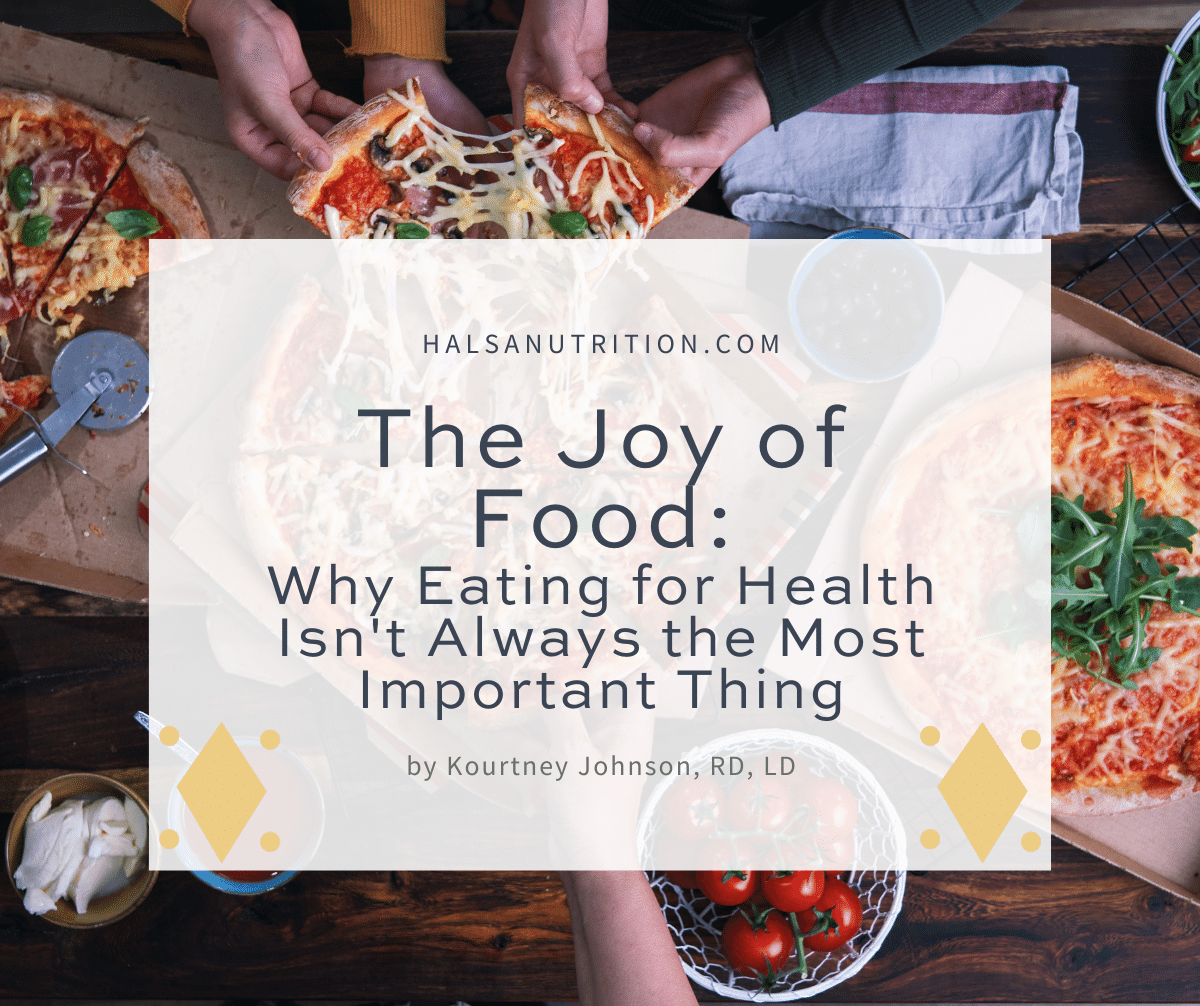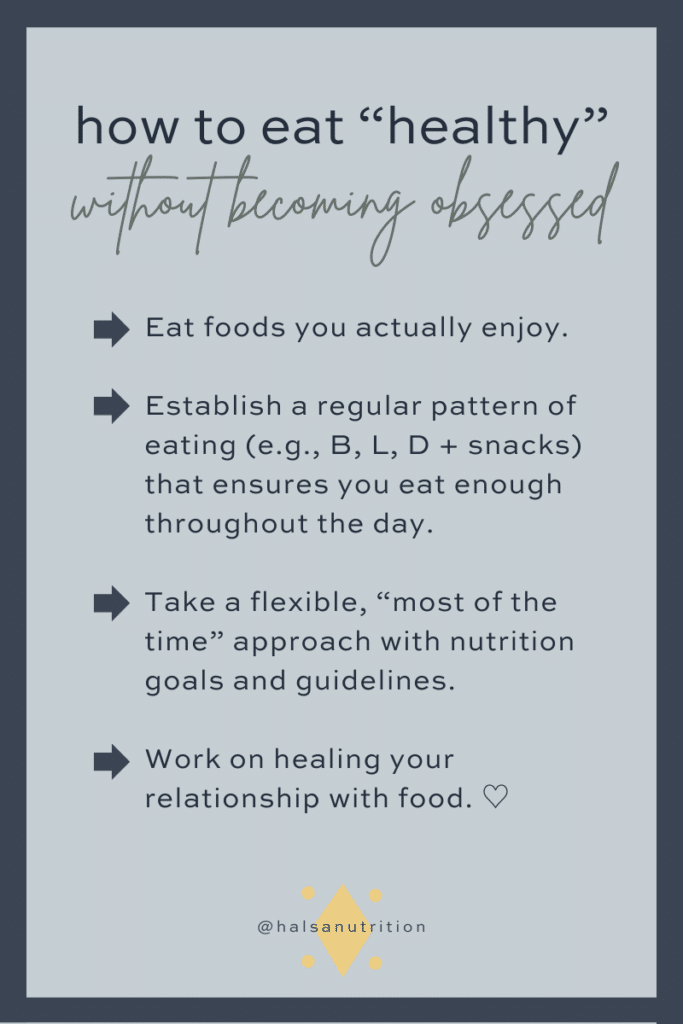
The Joy of Food: Why Eating for Health Isn’t Always the Most Important Thing
Estimated reading time: 7 minutes
by Kourtney Johnson, RD
We always hear about healthy eating and how food is medicine. When you go to the grocery store, you probably see hearts next to foods that are heart-healthy, or even shop in health markets where food is organic or more selective. But have you ever thought about the joy of food and its other purposes besides helping us stay healthy?
Not to mention that focusing too much on healthy eating can bring up its own problems, from contributing to the development of orthorexia and other eating disorders to being stressed about what you eat.
The bottom line is that food is more than fuel. Let’s explore its other functions!

The Joy of Food
Think about when you sit down to eat a savory, juicy burger or sip on creamy hot chocolate. How is your mood when that happens? If you’re like most people, you’re excited to dive into these delicious treats.
Science shows there’s a good reason for your good mood. Dopamine, which is a neurotransmitter that’s part of the brain’s reward system, is released when we do activities that our brains see as good for us and that we enjoy, such as eating. Releasing dopamine is the way our brains reinforce an activity and encourage us to do it again.
Think about comfort foods. Is there a dish your grandma used to make that takes you back to her kitchen whenever you eat it? Or was there a food you and your friends loved during college that you always eat when you get together?
Comfort foods make us feel happy psychologically, which contributes to us experiencing the joy of food. In fact, psychological studies have shown that the comfort foods we desire are ones from our past. They connect us to memories and people, which makes us feel similar to how we do when dopamine is released.

Find the Satisfaction in Eating
One of the principles of Intuitive Eating is “Discover the Satisfaction Factor.” When we eat what we actually want, whether that’s popcorn, chocolate, salad, or bread, we experience the joy of food.
To put this in perspective, think about how you feel when you bring food for lunch that sounded good earlier, only to find you don’t want it at all when it’s time to eat. Your eating experience will likely be a lot less enjoyable than if you ate what sounded good.
Eating what you desire in a setting that’s enjoyable and peaceful also allows you to more easily determine when you’ve had enough food.
Keep in mind that you can feel satisfied and content eating any type of food, so those deemed “healthy” definitely aren’t off the table. However, the focus is on finding satisfaction, not on what is the most nutritious food available.
Food Soothes Emotions
According to Evelyn Tribole and Elyse Resch, the authors of “Intuitive Eating,” another reason to eat is to help soothe emotions. Note that it’s important to have other coping mechanisms besides eating in response to strong emotions or difficult situations, but food can help you feel better in the short term.
If you notice yourself eating often to deal with your emotions, it’s a good idea to figure out what’s going on under the surface. For example, if you’re feeling anxious, could you have an anxiety disorder? Food won’t solve the root of the issue, which is why you want to explore what’s really going on.
How to Eat “Healthy” Without Becoming Obsessed
As a registered dietitian, I fully support the role food can play in maintaining or improving your health. However, there is a fine line between eating for health and becoming obsessed with only eating what is considered healthy. Here’s how you can incorporate the joy of food with eating to support health.
Eat foods you enjoy
If you want to experience the joy of food and have a healthy relationship with it, it’s important to eat foods you actually like. If you eat things you don’t like just because you’ve heard they’re good for you, not only will you not have a good experience, but you’ll likely focus on eating purely for health reasons, which is an easy way to develop an eating disorder such as orthorexia.
And if it’s meal or snack time and you don’t know what you want to eat, think about the senses. Which consistencies, temperatures, flavors, and colors of food are appealing?
Establish a regular pattern of eating
One of the main reasons that people end up “overeating” is that they didn’t eat enough earlier in the day. When we skip meals or restrict our intake our gut and brain both become on high alert. Your body wants to keep you alive so it will do what it can to get you eat as soon as possible! You may get hungry, irritable, and begin thinking about food. Eventually, you may go so hungry that you want to eat everything in sight or crave whatever food you didn’t get enough of, e.g., carbs.
Establishing a regular pattern of eating can help keep you from getting over-hungry. Our bodies need more fuel about every 4 hours during the day. Depending on variables such as how much you eat at each meal and how active you are, you might get hungry a little sooner or later. Either way, for most people, this means eating breakfast, lunch, dinner, and snacks every day.

Take a “most of the time” approach to nutrition goals and guidelines
Intuitive eating is all about being flexible and taking a “most of the time” approach to nutrition goals and guidelines. For example, it’s great to aim to eat 5 different veggies every day or make sure that you get protein at each meal, but there is no reason to stress about this if it doesn’t happen. Likewise, it’s unrealistic to expect that this will happen every day. It’s about the overall habits on most days and most of the time.
Heal your relationship with food
The best way to eat in a way that provides your body with enough nutrients while also allowing you to experience the joy of food is to heal your relationship with it. This process involves getting curious about your beliefs, judgment, and habits around food. How are they helping or hindering you?
Healing your relationship with food isn’t easy. However, having someone in your corner such as Maria, who is a registered dietitian experienced in helping people become intuitive eaters, can make the process easier. She is available to answer your questions, provide a listening ear, and inspire you along the way!
Next steps
If you are interested in working with Maria, you can schedule a free call to learn more about her programs and chat about your health concerns as well as worries you have about food and body image. From there, you can make an informed decision about how to move forward!
Related Articles You Might Enjoy
- Meal Satisfaction: 12 Ways to Increase It
- From Stress Eating to Comfort Food: Understanding Emotional Eating
- Discover the Joy of Intuitive Eating
- Diet Culture and How to Spot it
- The Gut-Brain Connection and How It Impacts Digestion
- The Honeymoon Phase in Intuitive Eating
About the Author
Kourtney is a registered dietitian who is passionate about sharing information related to intuitive eating and the harms of diet culture. She is from Minnesota but now lives in Spain, where she enjoys trying new foods and learning more about the culture there! In her free time, she likes to read, go to the beach, spend time with friends and family, and travel.
This article was edited and reviewed by Maria Adams, MS, MPH, RDN, LDN, a registered dietitian and Certified Intuitive Eating Counselor. Maria takes a weight-inclusive approach and helps individuals rediscover the joy of food and eat to feel their best by healing from chronic dieting and disordered eating. She holds a Bachelor of Science Degree in Nutrition Science, a Master of Science in Nutrition Communication, and a Master of Public Health.
Leave a Reply